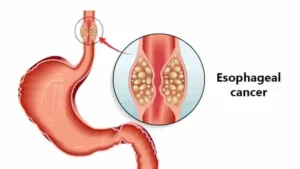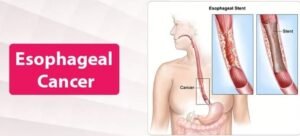Esophageal Cancer Surgery in Delhi
Esophageal cancer, a formidable adversary, is a disease shaped by a complex interplay of risk factors, genetic mutations, and global disparities. Esophageal cancer’s global incidence is staggering, ranking as the 8th most common cancer worldwide. Some regions, like China and Iran, face significantly higher rates due to lifestyle factors. Genetic mutations can also be inherited or arise spontaneously within the esophagus.
Two primary subtypes, squamous cell carcinoma and adenocarcinoma, pose distinct challenges due to their different associations. Squamous cell carcinoma is more prevalent in certain regions due to tobacco and alcohol use. On the other hand, adenocarcinoma is often linked to obesity, gastroesophageal reflux disease (GERD), and dietary habits, particularly in Western countries.
Survival rates are a stark reminder of the disease’s severity, with a 5-year survival rate hovering around 19.9% globally. However, the prospect of improved outcomes arises from screening and early detection programs that can identify precancerous changes and reduce the risk of cancer development.
Esophageal cancer surgery can be a life-saving procedure. Dr. Deep Goel, who has significant expertise in treating esophageal cancer, emphasizes the need for immediate surgery. With years of experience, he emphasizes that when esophageal cancer is identified early, the surgical success rate is substantially higher, underscoring the critical importance of early detection and the potential for long-term survival under the care of trained surgical teams.
This blog will discuss the critical role of surgery in battling this formidable adversary and how it offers patients a renewed chance at life.
Reach Out for Expert Care
What is the Esophagus?
The esophagus is the top food channel, beginning at the neck. It transfers food from the upper abdomen to the stomach.
Its primary function includes:
- Transport: The esophagus facilitates the movement of swallowed food and liquids from the mouth to the stomach.
- Peristalsis: Muscular contractions, known as peristalsis, push the contents downward in coordinated waves.
- Mucus Production: Mucus is secreted to lubricate and protect the esophageal lining.
- No Digestive Enzymes: Unlike the stomach and intestines, the esophagus does not produce digestive enzymes or absorb nutrients.
- Anti-Reflux Mechanism: It contains a lower esophageal sphincter to prevent stomach acid from flowing back into the esophagus.
- Temporary Storage: It temporarily stores food before it’s pushed into the stomach for digestion.
- Passage of Swallowed Air: It allows swallowed air to escape, preventing excessive gas buildup.
How do Esophageal Cancers form?
Cancer grows uncontrollably into a mass, clogging the pipe. They are among the top 10 most prevalent malignancies, yet the specific etiology is unknown. Alcohol, smoking, and tobacco use all raise the chance of acquiring cancer by a factor of 100.
Dr. Goel states, “Esophageal cancer usually develops as a result of a combination of risk factors and genetic abnormalities. Smoking, excessive alcohol use, poor nutrition, obesity, and persistent acid reflux can all cause esophageal damage over time. Cancer can result from genetic abnormalities in esophageal cells that disrupt normal development and division. The condition can grow from precancerous alterations to severe stages with apparent symptoms as it advances.”
What are the Signs and Symptoms of Esophageal Cancer?
The primary symptoms include trouble swallowing food, which begins with solids and can escalate over months to the point where you can’t even drink water, as well as weight loss and weakness. If you have difficulties swallowing and it lasts longer than two weeks, see a doctor immediately.
Aside from trouble swallowing, additional indications and symptoms of esophageal cancer include:
- Unintentional Weight Loss: Significant and unexplained weight loss is a typical symptom of esophageal cancer, which is generally caused by decreased food intake and the malignancy’s metabolic effects.
- Persistent Heartburn: Chronic heartburn, especially if it does not respond to antacids or lifestyle modifications, can be an early sign of esophageal cancer.
- Chest Pain: When cancer has progressed and impacts the surrounding tissues, discomfort or pain in the chest, particularly behind the breastbone, may arise.
- Chronic Cough: The tumor can induce irritation and inflammation of the esophagus, causing a chronic cough, occasionally with blood in the sputum.
- Hoarseness: When a tumor compresses the nerves and structures of the throat, changes in voice, such as hoarseness, can develop.
How is it diagnosed?
To confirm the diagnosis, upper gastrointestinal endoscopy and biopsy are done under anesthesia. The process is painless and takes around 15 minutes. You may be required to stay in the hospital for four hours. There are no long-term consequences.
A biopsy is entirely safe and has nothing to do with cancer cell spread, as some patients worry. Following the biopsy, you may require CT or PETCT scans, both safe outpatient procedures. A CT scan takes about 20 minutes, and the radiation exposure is well within safe levels. This test determines the degree of the condition and can be used to plan subsequent therapy.
How is it treated?
According to Dr. Deel Goel, surgical intervention is the primary therapy.
Surgical intervention for esophageal cancer involves the removal of the cancerous tissue in the esophagus. Depending on the stage and location of the tumor, procedures may include esophagectomy, which removes a portion of the entire esophagus, as well as lymph node dissection.
In some cases, the upper stomach is used to reconstruct the esophagus. Surgery aims to eliminate the cancer and restore the patient’s ability to swallow and eat. It is often combined with other treatments like chemotherapy and radiation to maximize the chances of success.
Other than this, a frequent technique in cancer treatment is the combination of chemotherapy and radiation therapy, which is often used to improve the efficacy of surgery. This combination, known as chemoradiotherapy, is adjusted to the stage of the disease identified by diagnostic tests.
“Chemotherapy uses medications to target cancer cells throughout the body, whereas radiation treatment uses high-energy beams to target and reduce the tumor directly,” mentioned Dr. Goel.
The purpose of combining these therapies is to minimize tumor size, making it more manageable for surgical removal. This method improves the likelihood of effective surgical intervention and overall results for cancer patients.
How is the Procedure Carried Out?
“Esophagectomy, a crucial procedure for esophageal cancer treatment, has evolved significantly. Modern techniques often involve laparoscopic or thoracoscopic approaches, which use 3 to 4 tiny incisions (each 1 cm or less) in the abdomen and chest. This minimally invasive method is a departure from traditional open surgery, resulting in reduced trauma, shorter recovery times, and fewer complications for patients.
Surgeons use specialized instruments and a camera to remove the affected esophagus and potentially part of the stomach. This advanced approach aims to achieve the same oncological outcomes while improving the overall patient experience and quality of life,” says Dr. Goel.
According to research, modern keyhole surgery is far less painful, faster to recover from, and safer. Robotic surgery enhances it by improving accuracy and reducing the risk of injury to nearby organs. After surgery, the food pipe containing the cancer is removed, and feeding continuity is restored using the stomach. You might be hospitalized for 7 to 8 days.
Reach Out for Expert Care
How Much Does Oesophageal Cancer Treatment Cost in India?
The average cost of esophageal cancer surgery in India is USD 4,500 (INR 330,500), which is one of the prime factors that entice patients to come to the country for treatment. The cost, however, may vary based on several criteria, including hospital facilities, surgeon experience, medical needs, and post-operative care.
In India, the cost of oesophageal cancer therapy is eight to ten times lower than in other nations. Furthermore, even after accounting for travel, lodging, and food expenses, the quality and grade of medical care and services are comparable to those of the world’s premier hospitals.
How will the Patient’s Quality of Life be Affected?
You will be able to take liquids by mouth starting the following day of surgery, and by the time of discharge, typically around the 8th or 9th day, most patients will be able to resume a regular diet. Leaks, chest infections, and voice alterations are post-surgery problems that are treated conservatively and seldom necessitate reoperation.
Almost 90% of patients regain a standard quality of life, eat properly, and return to work within a few weeks following an operation. Normal eating is a fundamental human right that can only be restored if an esophagectomy is considered.
The influence of esophageal cancer therapy on the patient’s quality of life is frequently highlighted in patient testimonials. Here’s an example of two patient recommendations for Dr. Deep Goel:
“Dr. Deep Goel is a brilliant surgeon and a kind healer.” His competence in esophageal cancer surgery not only saved his patient’s life but also allowed her to enjoy meals with her family once again. ” My quality of life post-surgery is a testimonial to his excellent care,” the patient remarked.
“Choosing Dr. Deep Goel for my esophageal cancer surgery was the finest decision I ever made.” His knowledge and expertise are unrivaled. I’m not just surviving; owing to his knowledge, I’m thriving. My quality of life has dramatically improved due to his care and support,” stated another happy patient of Dr. Deep Goel.
Conclusion
Esophageal cancer surgery can be a life-saving procedure. However, its efficacy depends on several circumstances, including the stage of diagnosis, the patient’s general condition, and the surgical team’s ability. Dr. Deep Goel’s years of experience treating esophageal cancer, along with a multidisciplinary approach, underscore the potential for favorable outcomes. Early detection is still critical. While esophageal cancer surgery provides hope, prevention and frequent health checks are essential in lowering the risk of this challenging disease and maximizing its potential as the ultimate lifesaver.
Related Blogs

Can Lifestyle Changes Help Prevent Esophageal Cancer?
Esophageal cancer is a significant health concern characterized by a high mortality rate. It originates…
Read Article →
What Are the Pros and Cons of Esophagus Cancer Surgery?
Esophageal cancer is a malignant condition that affects the esophagus, the tube connecting the throat…
Read Article →
What are the Causes and Symptoms of Esophageal Cancer? – Dr. Deep Goel
According to the World Cancer Research Fund International, over 500,000 cases of esophageal cancer were…
Read Article →